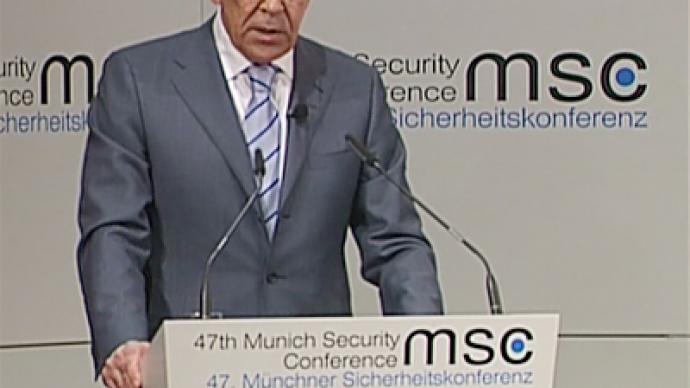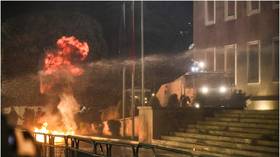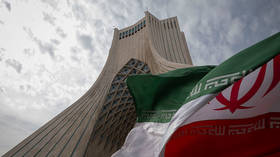Euro-ABM should not fog NATO’s ABM plans in Europe – Russian FM

Speaking at the 47th Munich Security Conference, Sergey Lavrov stressed that if the discussed Euro-ABM is used as a smoke-screen for American plans for global NATO ABM in Europe, Russia will reciprocate to “compensate the emerging imbalance”.
The Russian foreign minister warned that there is a risk of losing a unique chance to create a true strategic partnership between Russia and American-led NATO if the Russian position is not taken into consideration.
Russian foreign minister’s speech at the Munich Security Conference
“If the dialogue with Russia is used to distract attention from the US-NATO missile defense system we stand a risk of missing a unique chance. I think everybody understands that the agreement to discuss, within the NIC (NATO Infrastructure Committee), possible co-operation in missile defense in no way means that Russia willingly agrees to accept that NATO program developed without Russia,” Sergey Lavrov said.“The principle ‘take it or leave it’ does not work here. If our concerns are not taken into account, if equitable joint work is not achieved, then we will have to compensate for the emerging imbalance. Such a scenario, regrettably, may entail reversion to the past-thinking patterns.”Russia is still calling on its Western partners to create and develop a legal document to ensure European security. That offer is still on the table together with the initiative – originally discussed at the Russia-NATO council meeting in Lisbon – to build a unified anti-missile defense system that would include Russia, the EU and the US, thus sharing the responsibility for the safety of all parties involved.“There is a lot that remains to be done to irreversibly overcome the accumulated historical clichés, phobias and suspicions in order to materialize – in the practical politics of all our countries – the principle of indivisibility of security proclaimed in our joint project. We are ready to fulfill the most serious collective work in this key area of Euro-Atlantic and global policy. The time has come to make a choice between common strategic interests and immediate reasons of political expedience,” Lavrov concluded.US Senator John McCain, who made his speech after the Russian foreign minister, also mentioned the need to get rid of old stereotypes, though he was talking about Iran.“We are proceeding to deal with the threat we face from Iran, not from the former Soviet Union.”The Munich Security Conference is often referred to as a ‘security demo’ because it shows global security aims and the global politics that will shape the rest of the year.The meeting will also see the new key US-Russia Strategic Arms Reduction Treaty come into effect when the two sides exchange the pact’s official documents.On the sidelines of the conference on February 5, Russian Foreign Minister Sergey Lavrov and US Secretary of State Hillary Clinton are expected to exchange the so-called instruments of the ratification of the New START.This will signal the moment when the treaty will come into force, the Russian Foreign Ministry announced. RT also managed to catch up with Russia's Foreign Minister – watch his interview on Spotlight.The ratification of the treaty will improve the Euro-Atlantic climate, NATO Secretary General Anders Fogh Rasmussen told the conference.The New START treaty establishes a limit on American and Russian nuclear arms. It stipulates the reduction of deployed warheads to 1,550 for each side, as well as considerable reductions in other types of weaponry.The new deal succeeds Strategic Arms Reduction Treaty I, which was signed by Russia and the US back in 1991. It also replaces the Strategic Offensive Reductions Treaty (SORT) signed in May 2002.The current unrest in Egypt and the situation in the Middle East, frozen conflicts, European and Euro-Atlantic security are also all up for discussion.












